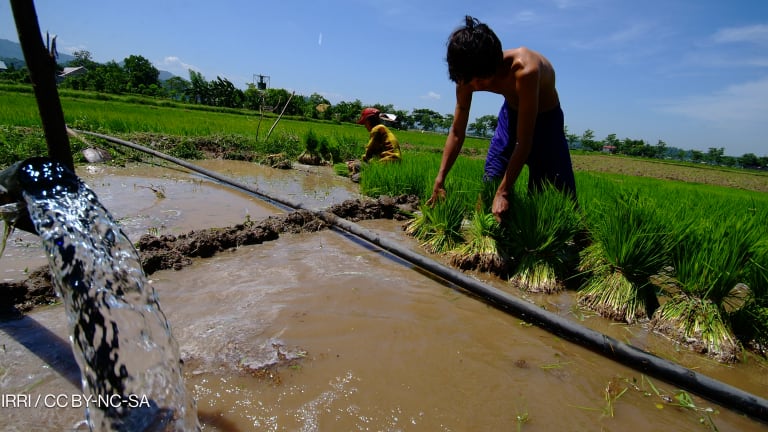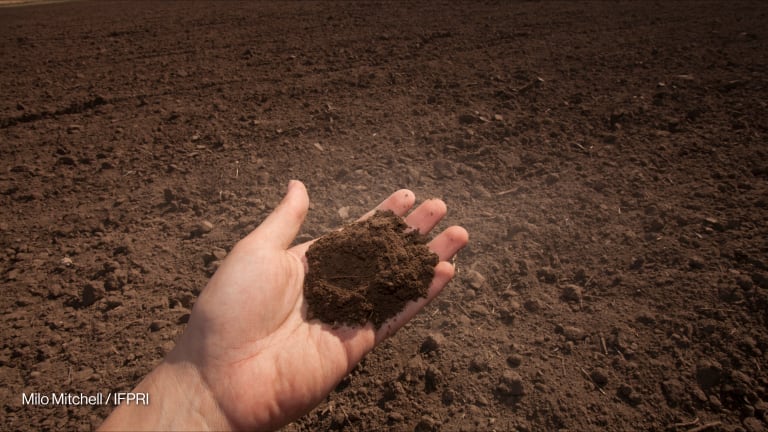To appear more climate friendly, Australia seeks to share its agricultural knowledge
As Australia looks to promote a climate friendly version of itself, its expertise in research and development in mitigation and adaptation to climate change is becoming even more important.
Australia’s environmental conditions can change rapidly — from drought to the floods currently being seen on the east coast of Australia. With climate change, conditions are becoming harsher and weather more violent. For the agricultural sector, this creates an environment that requires flexible adaptation. With it a key contributor to emissions there has been strong investment in research and development to improve and adapt farming practices — including in greenhouse gas mitigation. In Canberra on March 23, this research and development was the focus of discussions as part of a new outward-facing agenda to promote Australia in a new light — one with strong climate credentials in the lead-up to the United Nations’ Food Systems Summit in July and COP 26 in November. In preparation for the food systems summit, member states are engaging in a range of dialogues to consolidate the commitments they intend to bring to the table. The Department of Foreign Affairs and Trade along with the Australian Centre for International Agricultural Research and The Crawford Fund hosted Australia’s first dialogue to engage on a priority for Australia — promoting climate-friendly agriculture that aims for carbon-neutrality. Food production adapting to the climate crisis Australia’s diversity in agricultural production and the climates in which it operates provide particular challenges and opportunities for research and innovation. As part of the dialogue, Mark Wootton from Jigsaw Farms discussed how his farm was integrating forestry, carbon, and Indigenous plantings with grazing on a large scale to reduce their environmental footprint. Terry McCosker from Resource Consulting Services discussed his research in rebuilding soil health for improved productivity and carbon sequestration. And Lucinda Corrigan from the Rennylea Pastoral Company explained her approaches in encouraging changing practices: an evidence-based approach that shows better outcomes for the farmers. Fiona Simpson, president of the National Farmers’ Federation, explained that investment in agriculture that mitigates and adapts to the climate crisis is a priority in their roadmap. “It is important that we embrace the challenge of climate change that will continue to throw up curveballs,” she said. “The existential challenge [of] this century is to deal with the nutrition challenge and the climate change challenge together. And agriculture is central to both of those.” --— Andrew Campbell, CEO, Australian Centre for International Agricultural Research Ensuring future farms are sustainable but profitable are key goals in their agenda, with their aim for Australia to be a $100 billion agricultural industry by 2030 and carbon neutral by 2050. Methods for emission reductions, carbon sequestration, reducing environmental impact are important in this as well as reducing food waste and improving production quality. Innovative farming practices are required to achieve this with Agricultural Innovation Australia — a body of 15 research development corporations driving research and private sector investment in this space, an important driver of improved agricultural practices including the reduction of food waste. This is knowledge, Simpson said, that needed to be shared to support global food systems. Translating local investment to global agricultural production — improving Australia’s climate credentials The changing political landscape on climate is less tolerant of Australia’s current emission goals. Prime Minister Scott Morrison was rejected from a speaker slot at a December climate summit due to Australia’s lack of ambition. And the new Biden administration’s climate focus places additional pressure for Australia to be seen to be doing more. For Jamie Isbister, Australia’s ambassador for the environment, the development and innovation seen in Australia’s agricultural sector provide a more positive climate story on their “proud history of research in agricultural emissions.” And sharing this knowledge will be an important part of the priorities to be set for the food systems summit and Australia’s engagement on climate in the Pacific. “Clearly now there is a strong emphasis now, not only [at how] Australia looks to address climate change domestically, but particularly how we work with and support countries in our region,” he said. Nature-based solutions, adaptation, and resilience that produce sustainable farming practices are the priority for Isbister, which will incorporate blue carbon, better use of coastlines, seagrasses, and mangroves as well as incentivizing greater private sector investment. Shifting the conversation is also important for Australia’s international engagement. “If we’re not collectively trying to move away from the binary debates on climate to where … the opportunity and hope is, then I think it undermines the ability to deliver ambition into action in a very substantive way,” he said. Andrew Campbell, CEO at ACIAR, was announced as the new chair of Global Research Alliance on Agricultural Greenhouse Gases on March 23 — a role Isbister sees as advancing Australia’s story. Through this alliance, work is being undertaken to support knowledge sharing, including enabling scientists from low- and middle-income countries to partner with international collaborators to foster knowledge sharing. “The big opportunities for us is to share our knowledge around challenges that are not yet resolved in Australia, but it’s important that we’re sharing scientific expertise in tackling them,” Campbell said. “The existential challenge [of] this century is to deal with the nutrition challenge and the climate change challenge together. And agriculture is central to both of those. Getting it right will be partnering at a scale we’ve never done before, and developing new coalitions right along the value chain.” The science itself and implementation can be held up by government processes and poor systems. Campbell and Isbister both explained that engagement with governments to break down barriers as well as investment in improved systems, technology, and apps to deliver better and faster information for the decision-making of farmers has been a priority for Australia through its development assistance. And in Australia, Campbell said that this investment can lead to improved market value justifying the investment at home.
Australia’s environmental conditions can change rapidly — from drought to the floods currently being seen on the east coast of Australia. With climate change, conditions are becoming harsher and weather more violent. For the agricultural sector, this creates an environment that requires flexible adaptation. With it a key contributor to emissions there has been strong investment in research and development to improve and adapt farming practices — including in greenhouse gas mitigation.
In Canberra on March 23, this research and development was the focus of discussions as part of a new outward-facing agenda to promote Australia in a new light — one with strong climate credentials in the lead-up to the United Nations’ Food Systems Summit in July and COP 26 in November.
In preparation for the food systems summit, member states are engaging in a range of dialogues to consolidate the commitments they intend to bring to the table. The Department of Foreign Affairs and Trade along with the Australian Centre for International Agricultural Research and The Crawford Fund hosted Australia’s first dialogue to engage on a priority for Australia — promoting climate-friendly agriculture that aims for carbon-neutrality.
This story is forDevex Promembers
Unlock this story now with a 15-day free trial of Devex Pro.
With a Devex Pro subscription you'll get access to deeper analysis and exclusive insights from our reporters and analysts.
Start my free trialRequest a group subscription Printing articles to share with others is a breach of our terms and conditions and copyright policy. Please use the sharing options on the left side of the article. Devex Pro members may share up to 10 articles per month using the Pro share tool ( ).
Lisa Cornish is a former Devex Senior Reporter based in Canberra, where she focuses on the Australian aid community. Lisa has worked with News Corp Australia as a data journalist and has been published throughout Australia in the Daily Telegraph in Melbourne, Herald Sun in Melbourne, Courier-Mail in Brisbane, and online through news.com.au. Lisa additionally consults with Australian government providing data analytics, reporting and visualization services.








